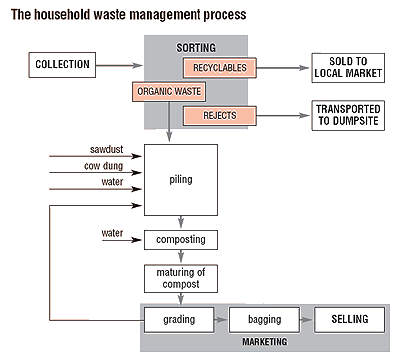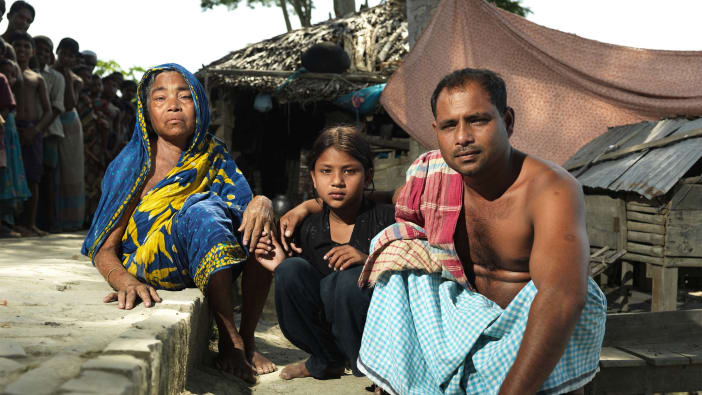by Iftekhar Enayetullah.
Over six million people live in Dhaka and each day they produce over 3,000 tons of household waste. Yet the Dhaka City Corporation collects less than half of it. The rest remains on roadsides, in open drains and in low-lying areas. This has a negative impact on the city’s environment. It is estimated that the population of Dhaka will be 19.5 million by 2015. It will become very difficult to find sites to bury the waste as the city expands, and transport costs to transfer the waste will increase. The volume of waste needs to be reduced to a sustainable level.
In Dhaka, scavengers known as tokai search for materials which can be reused or recycled. They sell them to enterprising local people who arrange for the materials to be sorted, cleaned and then sold to recycling factories. This informal system shows that waste has value.
Community-based composting project
An organisation called Waste Concern started a community-based composting project in 1995 to promote the concept of the ‘4 Rs’ – reduce, reuse, recycle and recover waste – in urban areas. It is based on the idea that the organic content of Dhaka’s household waste, which accounts for more than 70% of total waste, can be efficiently converted into valuable compost. This reduces disposal costs and prolongs the lifetime of landfill sites. It also reduces the harmful environmental impact of landfill sites, because organic waste is responsible for groundwater contamination and methane gas emissions. By turning the organic waste into compost, the soil in urban areas can be improved.
The project involved setting up a number of small-scale enterprises in different neighbourhoods. Activities include house-to-house waste collection, composting of the collected waste and marketing of the compost and recyclable materials. The project was so successful that in 1998 the government selected Waste Concern to extend the project to five other communities of Dhaka, supported by the United Nations Development Programme.
Waste Concern asked government agencies to provide land, water and electrical connections to establish the community-based composting plants. It also built up relationships with private companies to market the compost and recyclable materials. Waste Concern sets up community waste management committees and provides technical assistance and training to help them manage, operate and maintain the services. Members of the committees are mostly women. They are trained in collection, waste separation, composting and marketing. After a year of community mobilisation and training, Waste Concern hands over the project to the community but continues to monitor it for three years.
Waste collection
Rickshaw vans are modified to collect waste from each house. Each van has a part-time driver and one or two waste collectors, and serves 300–400 households. Households pay on average 20–35 cents per month to have their waste collected. This covers the salary of the van drivers and waste collectors as well as operation and maintenance costs. Households report that the house-to-house waste collection service is convenient. Some said that previously they could not rent out their houses due to the large, overflowing waste bins in front of them. After a few months the communities got rid of all the bins.
Composting process
Once the waste has been collected, it is taken to a nearby composting plant. Organic waste is converted into compost using a method that does not produce bad smells. This is important because the composting plants are located near homes rather than industrial areas. The waste is sorted into organic waste, recyclable materials and rejects. The rejects are collected by the Dhaka City Corporation and taken to the landfill.
The organic waste is piled around a bamboo rack to allow a good circulation of air which speeds up the breakdown of the waste. Sawdust is mixed with the waste to increase the air content. The pile is turned frequently in order to maintain the temperature and to ensure equal decomposition throughout the pile. Water is used to speed up decomposition. Chicken and cattle manure are added to increase the nitrogen in the compost.
This process takes 40 days. The pile is then left to mature without turning or watering for 15 days. The compost is then separated into fine and coarse grades and packed into 50kg bags to sell. Large lumps are recomposted. One plant produces 500–600kg of compost each day by processing 2–3 tons of household waste. This involves six workers, mostly women.
Marketing
There is a good market for compost in Bangladesh. Waste Concern helps the communities sell their compost to a number of businesses, such as fertiliser companies and plant nurseries. Each 50kg bag of compost sells for US $2.50– $4.50. Waste Concern have been asked to install more community-based compost plants to meet the growing demand for enriched compost.
This programme has significantly cleaned up communities, created jobs for poor people, reduced the Dhaka City Corporation’s waste management costs, and created business opportunities. Composting all organic waste in Dhaka would create new jobs for about 16,000 poor people, especially women. It has become a model which several city governments and NGOs are now trying to copy.
Learning points
- Community mobilisation is a long-term, time-consuming process. It is important to raise public awareness about the programme in order for communities to join.
- Efforts should be made to develop new techniques, such as enriching the compost to cater for the needs of companies who buy the compost.
- Marketing of the compost was an important feature of this programme. The programme is only financially possible if a market exists. A lot of time and effort was invested in developing relationships with private companies to market the product.
- The programme required partnerships with the public sector, private sector and civil society organisations.
Iftekhar Enayetullah is the co-founder and director of Waste Concern. E-mail: [email protected] Website: www.wasteconcern.org










